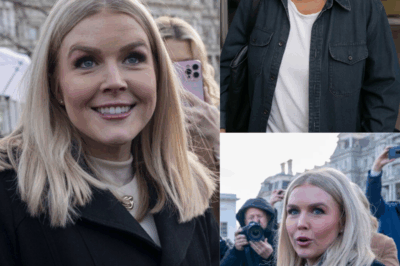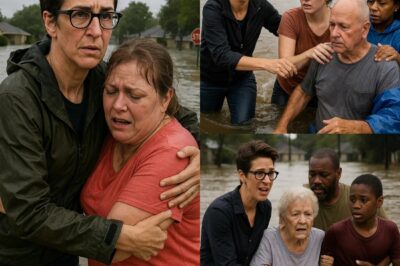“LATE-NIGHT TV ERUPTS: KAROLINE LEAVITT’S EXPLOSIVE TAKEDOWN OF ROBERT DE NIRO FORCES PRODUCERS INTO PANIC MODE—SEGMENT ABRUPTLY CUT AS STUDIO FALLS INTO CHAOS!
HOW DID THE YOUNG POLITICAL STAR LEAVE THE HOLLYWOOD LEGEND SPEECHLESS WITH HER BLISTERING ACCUSATIONS AND FACTS ON LIVE AIR? DISCOVER THE BEHIND-THE-SCENES DETAILS AND WHY THIS CONFRONTATION IS NOW DOMINATING SOCIAL MEDIA, SPARKING DEBATE, AND THREATENING DE NIRO’S LONG-ESTABLISHED REPUTATION!”
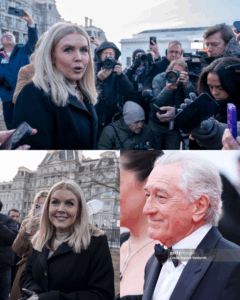
In a highly publicized confrontation that blurred the lines between politics and entertainment, renowned actor Robert De Niro sharply criticized Karoline Leavitt, the young and outspoken spokesperson for Donald Trump’s 2024 presidential campaign. The clash, marked by stark differences in ideology and values, has ignited a vigorous debate regarding the definition and criteria of a female role model, resonating across both political and celebrity spheres.
The controversy began at a prominent public event in New York when De Niro was asked for his thoughts about Karoline Leavitt, who has been rapidly gaining attention due to her vocal advocacy for conservative ideals and passionate representation of Trump’s political vision. De Niro, widely known for his progressive views and outspoken opposition to conservative politics, offered a scathing critique, stating bluntly, “I didn’t know who she was before, but if someone like that becomes a role model for young people, for women, then that’s just sad. She doesn’t represent anything but political blindness.”
De Niro’s pointed assertion that Leavitt was “not qualified to be a role model for women” quickly sparked intense reactions across social media and media outlets, highlighting the deep cultural and political divisions currently present in American society. Supporters of De Niro argued that his criticism was justified and necessary to counteract what they viewed as harmful conservative ideologies, while others strongly disagreed, claiming his comments unfairly marginalized conservative women who advocate for differing values.
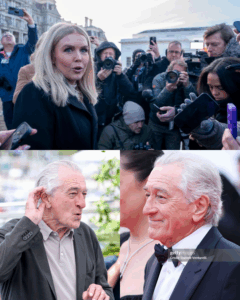
Leavitt responded swiftly and sharply on X (formerly Twitter), branding De Niro as a “washed-up actor clinging to political controversy to stay relevant.” Her fierce response affirmed her commitment to defending conservative values, free speech, and personal autonomy for women. “I’ll keep fighting for free speech, traditional values, and the right of American women to choose their path—something he clearly doesn’t understand,” Leavitt tweeted, a message that quickly went viral.
Leavitt’s rebuttal galvanized her conservative supporters, many of whom celebrated her willingness to confront an influential figure from Hollywood. This support was encapsulated in the viral hashtag #LeavittVsDeNiro, which quickly became a rallying point for conservatives who praised her courage and clarity. Prominent conservative figures echoed this sentiment, emphasizing the importance of protecting ideological diversity and the right to express traditional values publicly.

Conversely, supporters of De Niro emphasized the actor’s track record as a progressive advocate committed to social justice, equality, and inclusivity. His defenders argued that Leavitt’s conservative views were antithetical to progressive ideals necessary for societal advancement, suggesting that her prominence could negatively impact the perception of women’s roles in leadership positions.
At the heart of this heated exchange is a broader societal debate about who possesses the authority to define the attributes of an effective role model for women, particularly in the politically polarized environment of contemporary America. De Niro’s vision is grounded in progressive principles, with emphasis on advocacy for social justice, challenging entrenched norms, and inclusivity. In stark contrast, Leavitt embodies a conservative framework, advocating for individual liberty, traditional values, and freedom of expression.

Leavitt further elaborated her stance in a subsequent interview, criticizing what she perceives as media-driven stereotypes restricting the diversity of role models for women. “The media’s obsession with creating one mold for women to fit into is part of the problem,” she argued. “There is no one-size-fits-all role model. Every woman should be able to choose their path and be celebrated for it.” Her statement highlights a critical tension between individual choice and societal expectations, underscoring the ideological chasm between conservative and liberal interpretations of female empowerment.
The confrontation between De Niro and Leavitt reflects a broader cultural divide increasingly evident between Hollywood and conservative politics. Hollywood has historically aligned with progressive causes, amplifying liberal voices while often sidelining conservative perspectives. De Niro, who has consistently leveraged his celebrity status to criticize conservative politics and promote liberal policies, personifies this alignment. In contrast, Leavitt represents an emerging conservative counter-narrative that seeks visibility and legitimacy in mainstream discussions, particularly amidst perceptions of cultural and media exclusion.
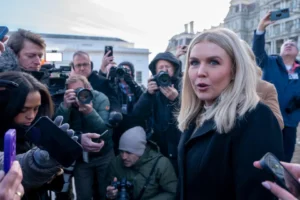
This cultural clash, exemplified vividly in the exchange between De Niro and Leavitt, serves as a microcosm of America’s current ideological polarization. As boundaries between entertainment and politics become increasingly indistinct, public figures on both sides have become symbols of deeper social conflicts. The willingness of celebrities to engage politically, combined with the increasing visibility of conservative public figures in traditionally liberal spaces, has amplified these tensions, transforming personal exchanges into highly charged symbolic confrontations.
The aftermath of this particular clash underscores a fundamental question regarding public discourse: is genuine coexistence between polarized political ideologies achievable in contemporary society? The incident spotlights the challenges inherent in balancing progressive and conservative voices within public and media spaces, often marked by intense confrontations rather than productive dialogue.
While De Niro’s criticism was viewed by many progressives as an essential rebuke of regressive ideologies, conservatives perceived Leavitt’s assertive response as emblematic of resistance against liberal dominance in media and culture. Conservative commentator Ben Shapiro emphasized this, stating, “Leavitt has done what so many others in her position are afraid to do—she’s challenged the liberal media head-on.”

Conversely, liberal commentators argued that De Niro’s critique was crucial in addressing ideological stances they believe undermine inclusive and equitable societal progress. For instance, an MSNBC anchor argued passionately, “We need role models who stand for inclusivity, justice, and equality. Leavitt’s views are divisive and go against the values of a free and fair society.”
This confrontation raises profound questions about the role public figures play in shaping discourse around gender, politics, and leadership. It forces society to grapple with uncomfortable yet vital questions about the criteria for leadership and representation. Whose perspectives deserve amplification? Who gets to define what is progressive or regressive? Can opposing political viewpoints be equally legitimate, or must one ideology dominate public narratives?
The intense polarization exposed by this incident suggests a challenging future for public discourse, where ideological divisions risk overshadowing efforts to find common ground. It highlights the need for broader, more inclusive dialogues capable of accommodating diverse political ideologies without resorting to destructive conflicts. Both De Niro and Leavitt symbolize significant societal segments whose voices remain crucial in shaping America’s political and cultural landscapes.

As both figures continue to influence public debate, their clash remains symbolic of broader ideological battles defining America today. Whether this confrontation ultimately leads to greater understanding and mutual respect or further deepens existing divides remains uncertain. Nonetheless, it undeniably underscores the urgent need for constructive dialogue capable of bridging political and cultural divides, ensuring diverse voices are recognized, respected, and integrated into public discourse.
In the end, this clash between Robert De Niro and Karoline Leavitt serves as a powerful reminder of the complexity inherent in discussions around role models, gender representation, and political ideologies. The conversation sparked by their confrontation challenges society to reflect critically on values, inclusivity, and diversity, emphasizing the necessity of mutual respect and open dialogue in navigating America’s increasingly divided cultural and political landscape.
News
“WHOOPI GOLDBERG VANISHES AMID $800M DEFAMATION SCANDAL: THE VIEW IN TURMOIL AS KAROLINE LEAVITT’S LAWSUIT UNCOVERS SECRET ABC EMAILS, TRIGGERS MEDIA MELTDOWN, AND RAISES QUESTIONS ABOUT ACCOUNTABILITY IN TV JOURNALISM”
“WHOOPI GOLDBERG VANISHES AMID $800M DEFAMATION SCANDAL: THE VIEW IN TURMOIL AS KAROLINE LEAVITT’S LAWSUIT UNCOVERS SECRET ABC EMAILS, TRIGGERS…
“AFTER DEVASTATING TEXAS FLOODS, CHIEFS COACH ANDY REID PROVIDES FINANCIAL RELIEF TO FAMILIES BY COVERING FUNERAL EXPENSES—THE EMOTIONAL STORY OF HIS GENEROUS OFFER”
“UPDATE: KANSAS CITY CHIEFS COACH ANDY REID STEPS IN TO COVER FUNERAL EXPENSES AND COMPENSATE VICTIMS’ FAMILIES AFTER TEXAS FLASH…
“LONG-TERM VISION: RACHEL MADDOW DONATES ANOTHER $5 MILLION TO TEXAS FLOOD SURVIVORS, ESTABLISHES SCHOLARSHIPS FOR FAMILIES—HOW WILL THIS SHAPE THEIR FUTURE?”
“BREAKING: RACHEL MADDOW DONATES ADDITIONAL $5 MILLION TO TEXAS FLOOD VICTIMS, UNVEILS SCHOLARSHIP FUND AND LONG-TERM RECOVERY INITIATIVE—WHAT’S NEXT IN…
“COACH ANDY REID’S POWERFUL RESPONSE TO TEXAS FLOOD TRAGEDY: PLEDGES SUPPORT TO VICTIMS’ FAMILIES BY COVERING FUNERAL COSTS—HOW THIS SELFLESS ACTION IS HEALING HEARTS”
“UPDATE: KANSAS CITY CHIEFS COACH ANDY REID STEPS IN TO COVER FUNERAL EXPENSES AND COMPENSATE VICTIMS’ FAMILIES AFTER TEXAS FLASH…
“RACHEL MADDOW’S HEARTBREAKING TRIBUTE: ADDS $5 MILLION TO TEXAS RELIEF, INTRODUCES SCHOLARSHIP FUND FOR CHILDREN OF VICTIMS—WHAT’S NEXT IN HER COMMITMENT TO RECOVERY?”
“BREAKING: RACHEL MADDOW DONATES ADDITIONAL $5 MILLION TO TEXAS FLOOD VICTIMS, UNVEILS SCHOLARSHIP FUND AND LONG-TERM RECOVERY INITIATIVE—WHAT’S NEXT IN…
“KANSAS CITY CHIEFS’ ANDY REID SHOWS COMPASSION AFTER TEXAS FLOODS, STEPS UP TO COVER FUNERAL EXPENSES AND SUPPORT GRIEVING FAMILIES—WHAT PROMPTED HIS HEARTFELT DECISION?”
“UPDATE: KANSAS CITY CHIEFS COACH ANDY REID STEPS IN TO COVER FUNERAL EXPENSES AND COMPENSATE VICTIMS’ FAMILIES AFTER TEXAS FLASH…
End of content
No more pages to load
